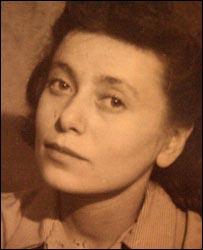Ilse Maria Aschner (geb. Römer)
| Born: |
09-26-1918 |
| Faculty: |
Philosophical School |
| Category: |
Expelled student |
Ilse Maria ROEMER (married: ASCHNER), born on September 26th, 1918 in Vienna/Austria (entitled residency ('heimatberechtigt') for Vienna/Austria, Citizenship: Austria), daughter of Gustav Römer (engineer, civil servant at "Wiener Gebietskrankenkassa"), lived in Wien 4, Seisgasse 18 I/9, was enrolled finally in the fall term 1937/38 at the Philosophical School in the 1st year of her studies and took courses in German language and literature Studies.
Ilse Roemer, born in 1918 into a bourgeois family of social-democratic convictions, called herself a "child of the republic". After a crucial experience he never wanted to share with anyone, her father insisted on having both himself and the children baptised according to the Evangelical rite. The mother remained free of religious affiliation. Thus, Ilse Aschner only found out on the day of the "Anschluss" [annexation] that, according to the Nuremberg Laws, she was a full-blooded Jewish woman.
Thus, although she had been studying German language and literature and education science since the first term of 1937/1938, she was not allowed to attend university any longer. In view of her father’s and brother’s layoff on the heels of the "Anschluss", the family was devoid of any income; therefore, they decided to flee the country. However, it wasn’t until a year later that Ilse Aschner was able to leave Vienna. Thanks to the intercession of Quakers, she managed to get to England, where she moved in with a pastor’s family to take care of their children. Her brother was able to follow her to England a short time after; her parents, on the other hand, were sent back to Germany from the Dutch border and deported to the Riga ghetto, where her father was murdered; her mother was sent on to the deportation camp of Stutthof, where she died in early 1945. Ilse Aschner and her brother only learned about their parents’ fate upon their return to Austria. While in exile, Ilse Aschner trained as a certified kindergarten teacher with the support of the Young Austria organisation, "a group of uprooted young Austrians", all the while hoping to be able to return to Austria. The end of the war remained etched in her memory as the "second most beautiful day" in her life. Her wish to return home was finally fulfilled in 1946. She had also hoped that, once back, she could resume her studies at the university. However, she had to defer that in favour of going to Salzburg together with her future husband, at the behest of the Austrian Communist Party, whose member she had become in exile. She stayed in Salzburg till 1947, the year her daughter was born; she interpreted for the US Army and worked for FOeJ [Freie Oesterreichische Jugend – Free Austrian Youth] in Glasenbach. Her political work found its continuation in Linz (1950-1958), Prague (1958-1962) and Vienna, from 1962 onwards. Starting from 1950, she had also worked for the Democratic Women’s Association. In the aftermath of the crushing of the Prague Spring by the Warsaw Pact, Ilse Aschner withdrew from the communist party. Her son, who had been born in Linz in 1956, went to the Czech school in Vienna. Ilse Aschner found a new field of activity as a journalist with Guenther Nenning’s newly founded publication Neues Forum [The New Forum].
Subsequently, she took over the Vienna office of the Graz Authors’ Association. Through her contributions to the Erste Wiener Lesetheater [First Vienna Readers’ Theatre], she found her way back to German language and literature. Since 1988 she has also been serving as a witness to history in schools.
Ilse Aschner died on October 10
th, 2012, in Vienna.
Lit.: POSCH/INGRISCH/DRESSEL 2008, 337; Josef HASLIGNER, Ilse M. Aschner erzaehlt, in: ders., Politik der Gefuehle. Ein Essay über Österreich, überarb. Neuauflage, Frankfurt am Main 1995, 91-105; WIKIPEDIA; SCHWARZ 2008; Vera SCHWARZ, Meine roten Großmuetter. Politische Aktivität aus der KPÖ ausgetretener/ausgeschlossener Frauen, Frankfurt am Main u.a. 2010; KNIEFACZ/POSCH 2017b, KNIEFACZ/POSCH 2017c; Matthias Kamleitner, Verfolgung zwischen "Anschluss" und Holocaust, in: Florian Wenninger u. Jutta Fuchshuber, Hg., Ich bin also nun ein anderer. Die juedische Bevoelkerung der Wieden 1938-1945, Wien 2017, 28-69, 50 bzw.: http://www.juedischewieden.at/ilse-roemer/; interview with Ilse ASCHNER on January 14th, 2003 in Vienna, Interviewer: Werner Lausecker and Herbert Posch; >>> videointerview at www.erinnern.at and >>> videointerview at www.oesterreich-am-wort.at.
Doris Ingrisch and Herbert Posch
